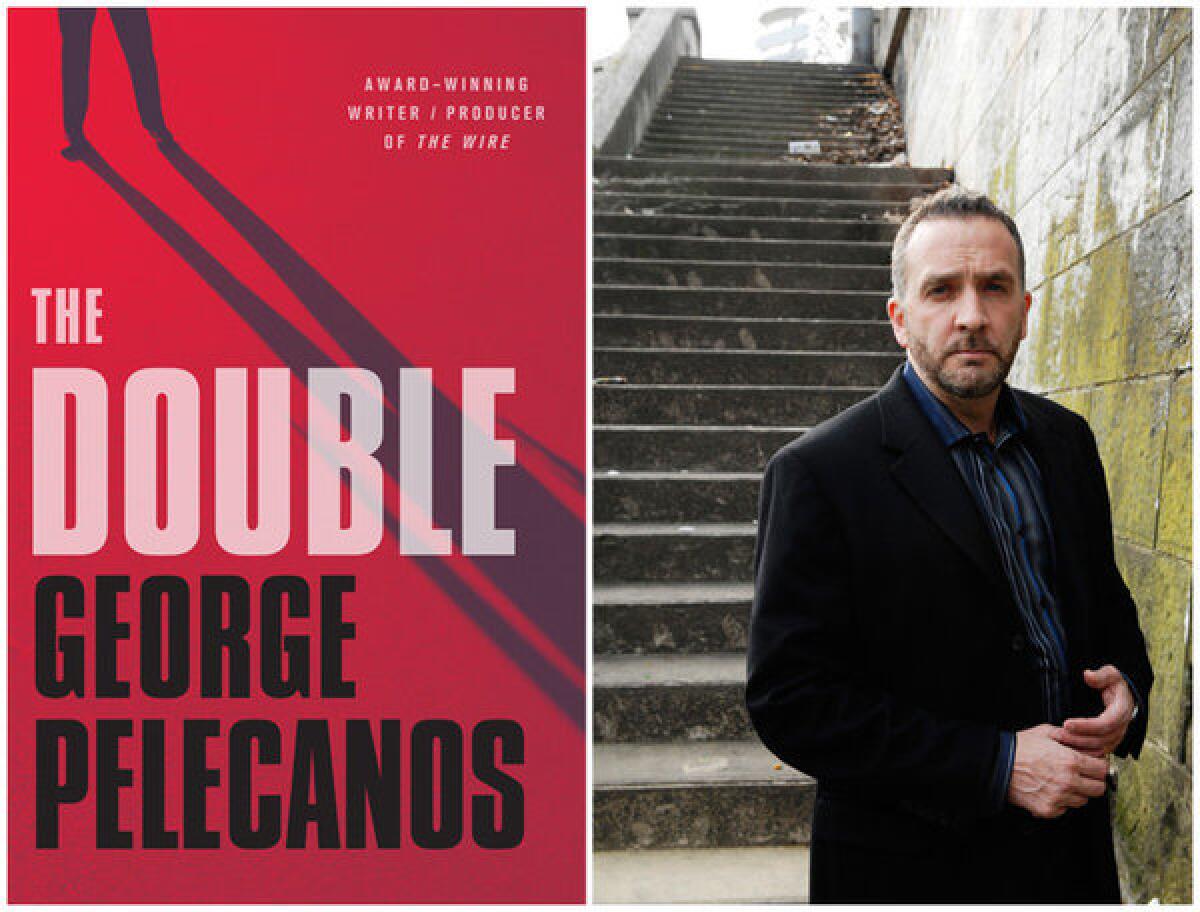George Pelecanos’ ‘The Double’ holds up a mirror to our dual selves

It’s tough to be a writer of crime fiction. Not because of the genre but because of the expectations: A book a year, preferably part of a series, the same character over and over again. This is why, say, Walter Mosley and Michael Connelly have branched out; Mosley set aside his hero, Easy Rawlins, for six years before bringing him back in 2013.
The same is true of George Pelecanos, the Washington-based author of the “D.C. Quartet” and a dozen other novels who has written about a variety of detectives as well as for television (“The Wire,” “Treme”). Pelecanos is a restless talent, but his books share a goal in common, which is to offer “a good story told with clean, efficient writing, a plot involving a problem to be solved or surmounted, and everyday characters the reader could relate to.” This too is part of the challenge, and the strength, of his writing — that he does all that while also managing to give us more.
Pelecanos’ new novel, “The Double,” is a case in point, his second book about Spero Lucas, a former Marine turned legal investigator who moonlights by taking cases for himself. In some sense, Spero is a detective in the classic mold, an outsider with a code of honor that doesn’t always jibe with the law. At the same time, he’s a very contemporary protagonist, an Iraq War veteran and D.C. lifer concerned that his gentrifying city is losing its soul.
Books: Sign up for our email newsletter
“There were whites, blacks, and Hispanics now on the streets,” he observes of one up-and-coming neighborhood, “and new coffee shops, bars, restaurants, and condos opening on the Avenue. Lucas couldn’t decide if the changes were positive. Maybe it was just a cultural and economic evolution. Neither good nor bad, just different.”
Here, we see Spero’s personality, engaged but also distant, as if he were standing half a step back from the world. This may or may not be fallout from his military service; as a psychiatric therapist at Walter Reed Medical Center tells him, “You seem disturbed.” What that means, for both Spero and the people around him, becomes increasingly complicated as he is drawn into a strangely brutal game of cat-and-mouse with a sociopath whose amorality reflects his own in many ways.
That, of course, becomes the heart of the novel, the interplay between Spero and Billy King, who has stolen a painting called “The Double” (hence, the name of the book) from a woman who hires Spero to get it back. What he discovers in the process are some difficult truths. Like Billy, Spero does not shy away from violence, even to the point of killing if he deems it necessary; at the end of one gun battle he reflects, with no emotion, of his antagonist: “He would have killed me.”
This too is what Pelecanos has in mind with his title, the idea that Spero and Billy are doubles, cut from the same elusive cloth. When, late in the novel, they confront each other, Billy makes it explicit: “You are me, fella. You’re as close to me as I’ve come across in a long while.” And yet that’s not true, not exactly, for if Spero is remorseless, he is not without conscience, which leaves him to question his own violent tendencies, his willingness to do anything and, on a larger scale, the kind of person he has (or wants to have) become.
It’s a lot for a crime novel — any novel — to get into, but Pelecanos pulls it off because he understands that story is just a frame. More important, where we find connection, is the inner life of the characters, their struggles and their failings, their small solaces and their mistakes.
“The Double” is terrific on those elements, even when it comes to Billy King. Here’s Pelecanos on his fading charm: “Now he was an aging stud nearing his expiration date. He knew this. The sun had wrinkled him prematurely, and though he was as muscled up as ever, he was carrying too much weight. Time seemed to be moving fast.” It’s impossible to read such a passage and not feel empathy, not for his activities but for him as a human being. This in turn only raises the stakes of his conflict with Spero, and Spero’s conflict with himself.
For Pelecanos, we are all just people, desperate to find a way through the murk of existence, investigator and criminal, perpetrator and victim, two sides of an irreconcilable coin. By rendering his characters equally self-aware and damaged, he affirms something about them while also making us complicit in their acts. What does it mean if we sympathize with Billy, even as we know that what he does is wrong? Only that, like Spero, he is tangled, empty: a dangerous man, yes, but also a broken one, as trapped by his behavior as any one of us.
In his acknowledgments to “The Double,” Pelecanos mentions crime writers John D. MacDonald, Charles Willeford and Don Carpenter, and thanks them for their influence. It’s not hard to see these antecedents, especially Willeford, who specialized in morally ambiguous characters and once wrote a novel, “The Burnt Orange Heresy,” that revolved, like this one, around a stolen work of art. Yet more apropos is Donald Westlake, whose Parker series (written under the pseudonym Richard Stark) offers a similarly uncompromising vision of a world where moral certainty is a luxury we can’t afford.
“You hit us, we hit you,” Spero thinks, after watching a film based on “The Outfit,” an early Parker book. “He and his platoon had executed the same creed in the streets and houses of Fallujah.” He may be home, Pelecanos is saying, but in every way that matters, he is still at war.
The Double
A Novel
George Pelecanos
Little, Brown: 292 pp., $26
More to Read
Sign up for our Book Club newsletter
Get the latest news, events and more from the Los Angeles Times Book Club, and help us get L.A. reading and talking.
You may occasionally receive promotional content from the Los Angeles Times.









